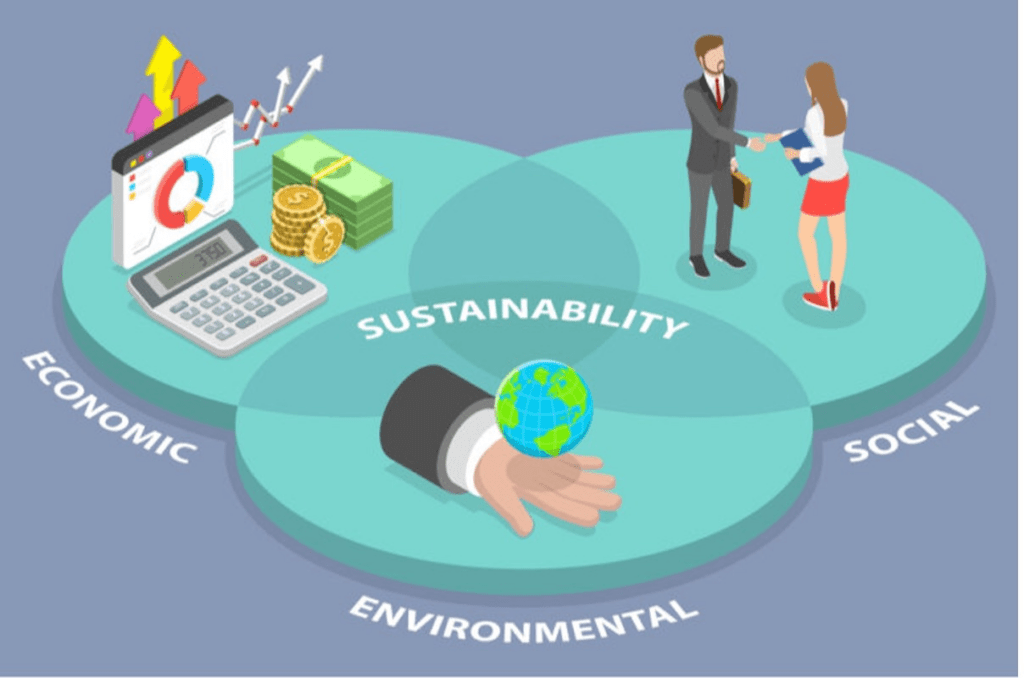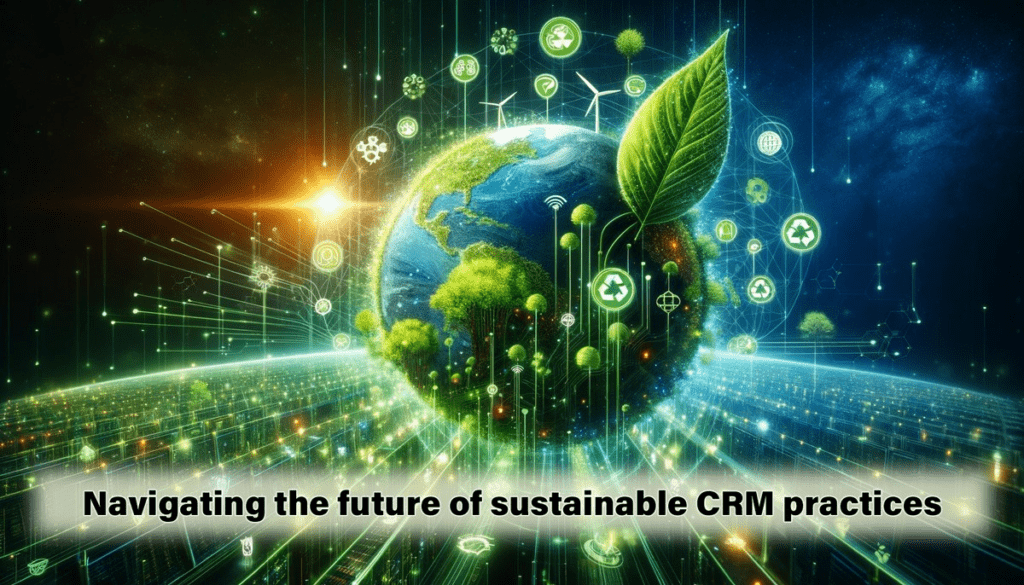As businesses increasingly recognize the importance of sustainability, the role of digital Customer Relationship Management (CRM) systems becomes more critical. While identifying a singular “most sustainable CRM” may be challenging, these systems undeniably foster sustainable practices in several key ways.
Benefits of Digital CRM Systems
Digital CRMs play a pivotal role in helping businesses reduce their environmental impact. By eliminating physical paperwork, these systems significantly minimize paper waste, contributing to a more sustainable operational model. In fact, businesses that transition to paperless environments can reduce paper use by as much as 90%, which not only saves trees but also cuts down on the energy used for paper production and transportation . Moreover, cloud-based CRMs facilitate remote work, which reduces the need for physical office space and lessens commuting, thereby lowering carbon emissions associated with travel. Studies show that enabling remote work can cut a company’s carbon footprint by as much as 60% .
In addition to minimizing their environmental footprint, digital CRMs enhance sustainability efforts by enabling data-driven decision-making. These systems provide valuable insights into customer preferences and behaviors, allowing businesses to identify areas for waste reduction and optimize resource utilization effectively. For example, a company using CRM analytics may find that certain marketing campaigns lead to higher returns with lower resource usage, allowing them to allocate funds more effectively . Furthermore, CRMs can track and manage supply chains, ensuring that sourcing practices are ethical and sustainable. This capability helps businesses maintain transparency and accountability in their operations, aligning with growing consumer demand for responsible and eco-friendly practices. By optimizing supply chains, businesses can achieve up to a 20% reduction in logistics-related emissions .
By integrating these functionalities, digital CRMs not only improve business efficiency but also contribute to a broader movement toward sustainability, making them an essential tool for modern enterprises committed to environmental stewardship. For instance, companies that effectively implement digital CRM solutions often report significant reductions in energy usage and waste generation, such as a notable decrease in overall operational energy consumption by as much as 30% . These examples illustrate that adopting digital CRM systems is not just a trend but a strategic move toward a more sustainable and responsible business model.

Choosing the Right Sustainable CRM Solution
When selecting a CRM with sustainability in mind, it is essential to consider a variety of factors to ensure that the solution aligns with both business needs and ethical practices. The first step in this process is to evaluate whether a cloud-based solution, such as Salesforce or HubSpot, or an open-source option, like CiviCRM or FluentCRM, would better suit your organization. Cloud-based systems are often favored for their robust features, scalability, and ease of integration with other software tools. They enable real-time updates and access from anywhere, which is particularly beneficial for businesses with remote or hybrid work environments. On the other hand, open-source platforms provide greater customization capabilities and cost-effectiveness, allowing organizations to tailor their CRM systems to meet specific operational needs without the burden of ongoing subscription fees. This flexibility can be a critical advantage for non-profits or smaller businesses with limited budgets.
Another crucial aspect to examine is the vendor’s commitment to ethical business practices and environmental responsibility. Researching the provider’s values and sustainability initiatives can help ensure that your chosen CRM not only meets operational requirements but also aligns with your organization’s broader sustainability goals. For instance, examining policies related to resource usage, waste reduction, and community engagement can reveal a vendor’s dedication to promoting sustainable practices. Companies like Salesforce, for example, have made significant strides in reducing their carbon footprint by committing to 100% renewable energy for their global operations, thereby contributing to a more sustainable future.
Furthermore, consider how the CRM system can enhance your organization’s sustainability initiatives. Many CRMs come equipped with tools that facilitate data-driven decision-making, allowing businesses to track their environmental impact and optimize resource utilization. For instance, advanced analytics can help identify areas for waste reduction and improve efficiency in supply chain management. By utilizing these features, organizations can make informed decisions that not only boost profitability but also contribute positively to environmental sustainability and social responsibility.
When evaluating potential CRM solutions, it is beneficial to look for features that specifically support sustainability efforts. Many systems now offer functionalities such as tracking and reporting on sustainability initiatives, measuring carbon footprints, and managing green supply chains. These capabilities can provide organizations with valuable insights into their environmental performance and enable them to set and achieve meaningful sustainability targets.
Moreover, consider the community and user support available for the CRM. A strong user community can provide resources, shared experiences, and best practices for implementing sustainable practices within the CRM framework. Additionally, ensure that the vendor offers robust customer support and documentation to assist with any challenges that may arise during the implementation and operation of the CRM system.
Ultimately, by thoughtfully considering these factors, businesses can select a CRM that not only enhances operational efficiency but also contributes positively to environmental sustainability and social responsibility. By choosing a solution that aligns with ethical practices, organizations can create a competitive advantage while fostering a culture of sustainability that resonates with both employees and customers.
Investing in a sustainable CRM is more than just a technological upgrade; it’s a commitment to ethical business practices and a sustainable future. By integrating these tools into everyday operations, businesses can make significant strides toward reducing their environmental impact while simultaneously improving efficiency and customer satisfaction. In doing so, they can set an example for others in their industry and demonstrate the critical importance of sustainability in today’s business landscape.
For further insights into sustainable CRM options and strategies, resources like GreenBiz and the Global Reporting Initiative provide valuable information on corporate sustainability practices and tools available for organizations looking to enhance their environmental efforts.

Recommended CRM Options
Here are some of the best choices based on functionality and pricing:
| CRM System | Type | Key Functionalities | Price |
|---|---|---|---|
| CiviCRM | Open Source | Contact management, event tracking, CiviMobile app | Free (with optional paid support) |
| FlowLu | Cloud-Based | Contact management, task management, project tracking, invoicing | Starts at $0 for Free version, with paid plans starting at approximately $29/month for the Essential subscription. Pricing scales based on features and number of users. |
| FluentCRM | Open Source | Email marketing, automation, and reporting | Free (with premium add-ons) |
| Salesforce | Cloud-Based | Comprehensive CRM, sales automation, customer service | Starting at $25/user/month |
| Odoo | Cloud-Based | CRM, ERP integration, sales tracking | Starting at $24/user/month |
| HubSpot | Cloud-Based | Marketing automation, sales tools, customer service | Free for basic; paid starts at $45/month |
| HiverBright | Cloud-Based | CRM integration with Gmail, team collaboration | Starting at $7/user/month |
In Short
By selecting a CRM system that emphasizes sustainability, organizations can enhance their operational efficiency while actively contributing to environmental conservation efforts. Open-source options like CiviCRM and FluentCRM provide cost-effective solutions with robust functionalities tailored for organizations focused on budget-friendly operations, while cloud-based systems such as Salesforce, Odoo, HubSpot, and HiverBright offer powerful tools that cater to a diverse range of business needs, from customer management to marketing automation.
The true sustainability of a CRM system extends beyond its features; it also hinges on how organizations leverage these tools to foster ethical practices and environmentally conscious initiatives. By adopting a strategic approach to utilizing these CRM systems, businesses can drive significant positive change, ensuring that their operations align with broader sustainability goals.
We are committed to assisting your organization in seamlessly installing and implementing systems like FlowLu, CiviCRM, and FluentCRM, which can significantly enhance your capacity to meet sustainability objectives. Additionally, our FREE service ensures that your transition to a more sustainable operational model is not only efficient but also cost-effective, minimizing the financial burden often associated with such changes.
For more information on how we can support your journey toward sustainable practices through effective CRM solutions, please contact us HERE. Together, we can build a more sustainable future while improving your business’s efficiency and impact.
Related Content
- FlowLu CRM: A Comprehensive Look at the All-in-One Business Management Platform
- Big Data Demystified: Turning Complex Data into Clear Insights for Strategic Growth
- Navigating the Future: A Look at Growth Potential and Sustainability in Key Stocks
- Excessive Shopping on the Internet: Recent Trends in Compulsive Buying-Shopping Disorder
- The Latest Breakthroughs in AI: What You Need to Know in 2024
- Understanding NFTs: The Digital Collectibles Market
- How CRM tools drive sustainability for small businesses
- Sustainability and CRM: Building Eco-Friendly Business
- How to Align Your CRM with Your Sustainability Goals
- CRM System and Sustainability Issues

